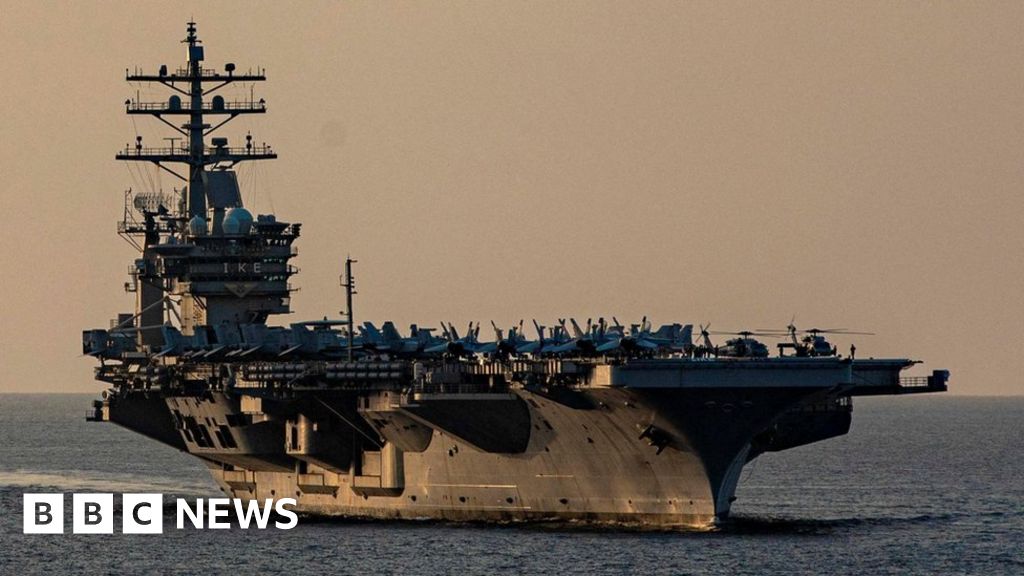USS Eisenhower helicopters responded to the second distress call from a Danish container ship in 24 hours.
The US Navy destroyed Houthi “small boats” whose crew attempted to board a container ship in the Red Sea.
The US military said that four ships from Houthi-controlled areas in Yemen opened fire on the Maersk Hangzhou, reaching within meters of the ship.
Helicopters from nearby American warships responded to a distress call and, after being fired upon, sank three boats “in self-defense.”
The crew members were killed and the fourth boat fled the area.
A Houthi spokesman said that the ship refused to respond to warning calls, and that 10 members of its group died or went missing after the accident.
Houthi forces have been attacking ships in the Red Sea since November, and have launched more than 100 drone and missile attacks on ships passing through the vital shipping lane.
The Iran-backed Yemeni rebel group previously claimed its attacks were directed at ships linked to Israel, in retaliation for the war in Gaza.
US Central Command (Centcom) said that the targeted merchant ship, Maersk Hangzhou, is registered in Singapore and managed and owned by a Danish company.
The four Houthi boats attacked around 06:30 Yemen time (03:30 GMT) with mounted weapons and small arms, coming within 20 meters (66 feet) of the container ship that the crew “tried to board.” Central Command said the ship's crew issued a distress call and a security team responded by firing.
Helicopters from the nearby aircraft carrier USS Eisenhower and the destroyer USS Gravely responded to the call for help and were fired upon while “issuing verbal calls to the small boats.”
Central Command said the helicopters “returned fire in self-defense, sinking three of the four small boats and killing their crews.” It added that the fourth boat “escaped the area” and no damage to American personnel or equipment was recorded.
This is the second attack on Hangzhou within 24 hours, after the ship was targeted on Saturday. The Central Command said that anti-ship missiles were fired from areas controlled by the Houthis, and the destroyers Gravely and Laboon responded.
Maersk said the attack occurred at around 17:30 GMT. It confirmed that its ship “was hit by an unknown object,” but “there was no indication of a fire on board.”
Maersk, one of the world's largest shipping companies, has suspended sailings through the Red Sea for 48 hours.
The company had resumed using this route only a few days ago, after the United States and its allies launched a mission to protect ships in the region.
Previously, its ships had diverted to a much longer route around the Cape of Good Hope due to recent attacks on ships.
A US Navy admiral told the Associated Press news agency that Saturday's missile attack was the first successful strike since the launch of a global patrol on December 18.
Central Command said that while the ships were responding to the distress call, two anti-ship missiles were launched from Houthi-controlled areas at two US Navy ships.
The US destroyer USS Gravely destroyed the incoming ballistic missiles, Central Command said, adding that this was the Houthis' “23rd unlawful attack on international shipping” since November 19.
Central Command added that the Maersk Hangzhou ship was “seaworthy and there were no reports of any casualties” on board.
Separately, the United Kingdom Maritime Trade Operations (UKMTO) reported an incident in the Red Sea about 55 nautical miles (101 km) southwest of the Yemeni port of Hodeidah.
The organization said that an unidentified ship reported “a strong sound accompanied by a flash on the port bow of the ship” and several explosions.
The statement added that no damage was recorded and all crew members were reported injured, with the ship escaping the area to a nearby port.
An escalation of Houthi attacks over several weeks has prompted several shipping companies, including Maersk, to divert their ships away from the Red Sea – instead of traveling around the Horn of Africa.
To reach Egypt's Suez Canal – which connects to the Mediterranean – ships must pass through the small Bab al-Mandab Strait, off the coast of Houthi-controlled areas of Yemen.
The Iranian-sponsored rebels have previously claimed to only target commercial ships “associated with Israel” in response to the war in Gaza, saying the attacks are an attempt to stop Israeli attacks on Palestinians.
British Foreign Secretary David Cameron said in a statement on Sunday that he informed the Iranian Foreign Minister that Tehran “shares responsibility for preventing these attacks given its long-term support for the Houthis.”
Watch: Yemen's Houthis released a video in November showing armed men descending from a helicopter and seizing a cargo ship
In an interview with the Associated Press, US Navy Vice Admiral Brad Cooper said the Houthis did not appear to be ending their “reckless” attacks in light of a new naval task force designed to combat them.
Earlier in December, the United States launched Operation Prosperity Sentinel – an international coalition to protect shipping in the region.
Vice Admiral Cooper added that 1,200 commercial ships have passed through the Red Sea since the start of the operation, and none of them had been subjected to drone attacks or missile strikes as of Saturday.
After announcing the international task force, the US Department of Defense said that the Houthis had carried out more than 100 attacks using drones and ballistic missiles since November. She added that these attack attempts targeted 10 commercial ships linked to more than 35 different countries.
The Red Sea is one of the most important shipping lanes in the world because it connects markets in Europe with Asia.
Analysts warned that the attacks could lead to higher prices, as it is also one of the most important routes for shipments of oil and liquefied natural gas produced in the Middle East.

“Beer buff. Devoted pop culture scholar. Coffee ninja. Evil zombie fan. Organizer.”







More Stories
Narendra Modi increases his anti-Muslim rhetoric in the Indian election campaign
Gaza students thank pro-Palestinian demonstrators on American college campuses
Venice Biennale: The Pope makes a historic visit and declares that “the world needs artists”